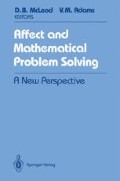Abstract
From the perspective of mathematics education, story problems represent a rather low-level, but important, type of problem solving. Unfortunately, there is little doubt that many people have strong negative feelings about story problems. Anecdotal evidence abounds (“I like math, except for story problems”), and is strengthened by an occasional study. Dutton and Blum (1968), for example, found that the statement “Word problems are frustrating” was one of the more commonly agreed-with statements among 346 students in Grades 6 through 8. It is sobering that even preservice teachers may share such negative feelings; 46% of Smith’s (1964) 123 preservice elementary teachers chose the statement “I am afraid of doing word problems” as representative of their feelings.
Access this chapter
Tax calculation will be finalised at checkout
Purchases are for personal use only
Preview
Unable to display preview. Download preview PDF.
References
Bell, A., Costello, J., & Kuchemann, D. (1983). A review of research in mathematical education (part A). Windsor, England: NFER-Nelson.
Bell, A., Fischbein, E., & Greer, B. (1984). Choice of operation in verbal arithmetic problems: The effects of number size, problem structure, and context. Educational Studies in Mathematics, 75, 129–147.
Dutton, W., & Blum, M. (1968). The measurement of attitudes toward arithmetic with a Likert-type test. Elementary School Journal, 65 259–264.
Dweck, C. (1986). Motivational processes affecting learning. American Psychologist, 41 1040–1048.
Eccles, J. (1983). Expectancies, values, and academic behaviors. In J.T. Spence (Ed.), Achievement and achievement motivation (pp. 75–146). San Francisco: W.H. Freeman.
Ekenstam, A., & Greger, K. (1983). Some aspects of children’s ability to solve mathematical problems. Educational Studies in Mathematics, 14, 369–384.
Fennema, E., & Peterson, P. (1983, April). Autonomous learning behavior: A possible explanation. Paper presented at the annual meeting of the American Educational Research Association, Montreal, Canada.
Fischbein, E., Deri, M., Nello, M., & Marino, M. (1985). The role of implicit models in solving verbal problems in multiplication and division. Journal for Research in Mathematics Education, 16, 3–17.
Greer, B. (1987a). Nonconservation of multiplication and division involving decimals. Journal for Research in Mathematics Education, 18 37–45.
Greer, B. (1987b). Understanding of arithmetical operations as models of situations. In J. Sloboda & D. Rogers (Eds.), Cognitive processes in mathematics (pp. 60–80). New York: Oxford University Press.
Greer, B., & Mangan, C. (1984). Understanding multiplication and division. In J. Moser (Ed.), Proceedings of the Sixth Annual Meeting of the North American Chapter of the International Group for the Psychology of Mathematics Education (pp. 27–32). Madison, WI: University of Wisconsin.
Greer, B., & Mangan, C. (1986). Choice of operations: From 10-year-olds to student teachers. Proceedings of the Tenth International Conference for the Psychology of Mathematics Education (pp. 25–30). London: University of London Institute of Education.
Institute for Research on Teaching. (1982, Summer). Do students learn from seatwork? Communication Quarterly 5(1), 2.
Lester, F., & Garofalo, J. (1982, March). Metacognitive aspects of elementary school students’ performance on arithmetic tasks. Paper presented at the annual meeting of the American Educational Research Association, New York.
Mangan, M.C. (1986). Choice of operation in multiplication and division word problems. Unpublished doctoral dissertation, Queen’s University, Belfast, Northern Ireland.
Nicholls, J. (1983). Conceptions of ability and achievement motivation: A theory and its implications for education. In S. Paris, G. Olson, & H. Stevenson (Eds.), Learning and motivation in the classroom (pp. 211–237). Hillsdale, NJ: Lawrence Erlbaum Associates.
Noddings, N. (1985). Small groups as a setting for research on mathematical problem solving. In E.A. Silver (Ed.), Teaching and learning mathematical problem solving: Multiple research perspectives (pp. 345–359). Hillsdale, NJ: Lawrence Erlbaum Associates.
Osgood, C. (1976). Focus on meaning (Vol. 1). The Hague: Mouton.
Osgood, C., Suci, G., & Tannenbaum, P. (1957). The measurement of meaning. Urbana, IL: University of Illinois Press.
Pereira-Mendoza, L. (1979, June). The mathematics curriculum—the decades ahead. Paper presented at the Second International Congress on Education, Vancouver, British Columbia.
Peterson, P., Swing, S., Stark, K., & Waas, G. (1984). Students’ cognitions and time on task during mathematics instruction. American Educational Research Journal, 27, 487–515.
Sherrill, J. (1983). Solving textbook mathematical word problems. The Alberta Journal of Educational Research, 29, 140–152.
Silver, E. (1985). Research on teaching mathematical problem solving: Some under-represented themes and needed directions. In E.A. Silver (Ed.), Teaching and learning mathematical problem solving: Multiple research perspectives (pp. 247–266). Hillsdale, NJ: Lawrence Erlbaum Associates.
Smith, F. (1964). Prospective teachers’ attitudes toward arithmetic. Arithmetic Teacher 77 474–477.
Sowder, L. (1986a). Strategies children use in solving problems. Proceedings of the Tenth International Conference for the Psychology of Mathematics Education (pp. 469–474). London: University of London Institute of Education.
Sowder, L. (1986b). Non-conservation of operation in American algebra students. In G. Lappan & R. Even (Eds.), Proceedings of the Eighth Annual Meeting of the North American Chapter of the International Group for the Psychology of Mathematics Education (pp. 90–93). East Lansing, MI: Michigan State University.
Sowder, L., Threadgill-Sowder, J., Moyer, J., & Moyer, M. (1983). Format variables and learner characteristics in mathematical problem solving (Final Technical Report). Washington, DC: National Science Foundation. (ERIC Document Reproduction Service No. ED 238 735).
Tirosh, D., Graeber, A., & Glover, R. (1986). Preservice teachers’ choice of operation for multiplication and division word problems. Proceedings of the Tenth International Conference for the Psychology of Mathematics Education (pp. 57–62). London: University of London Institute of Education.
Weiner, B. (1974). Achievement motivation and attribution theory. Morristown, NJ: General Learning Press.
Editor information
Editors and Affiliations
Rights and permissions
Copyright information
© 1989 Springer-Verlag New York Inc.
About this chapter
Cite this chapter
Sowder, L. (1989). Searching for Affect in the Solution of Story Problems in Mathematics. In: McLeod, D.B., Adams, V.M. (eds) Affect and Mathematical Problem Solving. Springer, New York, NY. https://doi.org/10.1007/978-1-4612-3614-6_8
Download citation
DOI: https://doi.org/10.1007/978-1-4612-3614-6_8
Publisher Name: Springer, New York, NY
Print ISBN: 978-1-4612-8178-8
Online ISBN: 978-1-4612-3614-6
eBook Packages: Springer Book Archive

